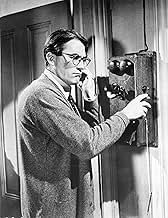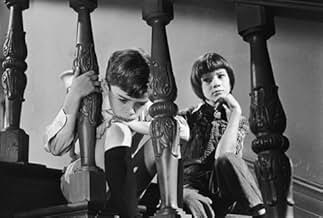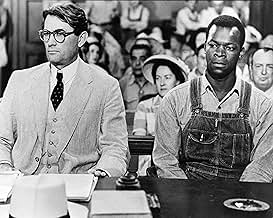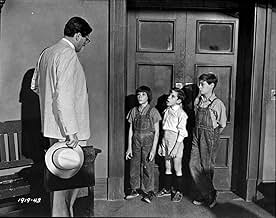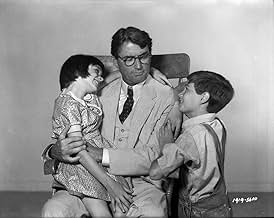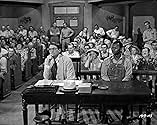Atticus Finch, ein Rechtsanwalt in den von der Depression gebeutelten Südstaaten der USA, verteidigt einen Schwarzen gegen eine nicht berechtigte Anklage wegen Vergewaltigung und versucht, s... Alles lesenAtticus Finch, ein Rechtsanwalt in den von der Depression gebeutelten Südstaaten der USA, verteidigt einen Schwarzen gegen eine nicht berechtigte Anklage wegen Vergewaltigung und versucht, seine (eigenen) Kinder vor Vorurteilen zu bewahren.Atticus Finch, ein Rechtsanwalt in den von der Depression gebeutelten Südstaaten der USA, verteidigt einen Schwarzen gegen eine nicht berechtigte Anklage wegen Vergewaltigung und versucht, seine (eigenen) Kinder vor Vorurteilen zu bewahren.
- 3 Oscars gewonnen
- 14 Gewinne & 16 Nominierungen insgesamt
- Mayella Violet Ewell
- (as Collin Wilcox)
- Man
- (Nicht genannt)
Zusammenfassung
Empfohlene Bewertungen
I first read Harper Lee's lovely novel when I was a young teen, and it was one of those books that gave me an experience that changed the way I perceived the world and my own family. The movie stays true to the wonderful, innocent prose.
Every time I watch, I see my father in Atticus Finch. He, too, is a southerner who respects people and defends his beliefs. He also has always respected his children and treated us the way Atticus treats Scout and Jem. I also see other family and friends in various characters in the film, because we have such strong southern roots. Even the negative aspects of racial antipathy and loss of childish innocence bring certain memories to mind.
Those who did not grow up in the south or with southern families might not see parallels the way I do, but the movie would be a gem to anyone. Gregory Peck put in the performance of his career, and the children acted in the least forced manner I have ever seen. The cinematography is also beautiful, and the script is perfectly balanced-not too sparse, but also not dialogue heavy.
The best thing about "To Kill a Mockingbird" is that it preserves the spirit of the novel that resounds with so many people. This film stands as one of the best ever arguments for tolerance, loving families, and the beauty of life through a child's eyes. Everyone who watches movies ought to see it.
"To Kill a Mockingbird" rises to the top of the pile easily.
Yes, the courtroom proceedings are nail-bitingly engaging. But played out against the tapestry of bigotry and hate make the legal goings-on even more compelling.
The writing here is so beautiful, so lyric, so poetic. The Harper Lee-based screenplay captures wonderfully a time and a place that are absolutely real--where big brothers could solve the universe's problems in an instant and all the treasures of the world could be contained in a cigar box.
"To Kill a Mockingbird" also contains three of the most impressive child performances I have ever witnessed--there's not a false or affected moment in any one of them. Until seeing "Ponette," a movie I would highly recommend, the kids in "Mockingbird" received my best child performance ever awards. "Ponette" has ratcheted them down one notch, but that doesn't diminish the achievement here. The scene in which Scout dispels the mob simply by identifying its individual members is one of the most powerful moments in filmdom.
Peck more than deserved his best actor nod. His quiet dignity is a definite asset. Brock Peters, too, is terrific in what could have been a cliched role.
If you are a moviegoer who has a bias against black and white movies and who has therefore never seen "Mockingbird," I pity you. You've passed on one of Hollywood's most unforgettable experiences.
Gregory Peck has always been one of my favorite actors. This is definitely one of my favorite roles that he has ever played, and he does an excellent job at it. Mary Badham and Philip Alford are excellent as Jem and Scout. Mary Badham became the youngest girl to receive an Academy Award nomination for best supporting actress for her role as Scout. Although it had a short time on screen, Robert Duvall's portrayal of "Boo" Radley was one of his very first roles on screen and what better movie than "To Kill a Mockingbird" to kick off your acting career.
A great movie of all times.
Act one puts Atticus in the background and allows the kids to flourish. Director Robert Mulligan was able to get such realistic performances from non-professional kids. They are amusing and fun to watch. The big mystery lies in the house down the street in this small Georgia town. Who is the monstrous, "6 and a half feet big" legend living in the end house? Some light suspense ensues, while the buildup to a stirring act two is happening. Atticus must defend an African-American man for the alleged rape of a white woman.
After threats galore, an unshaken Peck takes to the courtroom jungle in, without a doubt, one of the top 5 court scenes in motion picture history. Brock Peters lends the film its best moments as the accused "negro" on trial. This man has a face chiseled with suffering and deep, deep sorrow. We know Atticus is a good man, a decent human being with a soul. He sees this in his client as well, and in a closing argument that must have roused the civil rights movement, implores the jury to vote justice. An all-male, all-white jury in the 1930's were tough listeners. Peters' breakdown on the stand is one of the most realistic, emotionally saddening moments you'll ever see, especially in Hollywood films of the 1960's. The scene when Peck leaves the courtroom is now legendary as well.
Act three produces a tragic death, an unlikely hero, and the bringing together of a family. The filmmakers have such a passion for the material, they seem to handle it with gentleness. Racism is a hard-boiled subject and it is depicted and dealt with through grace and patience. TO KILL A MOCKINGBIRD poses the injustice of race relations in the 1930's as a front for the events happening in the 1960's. The film came out during turbulent times and was also an adaption of a literary classic. I am one to judge a film solely by film only. The book is a separate art form and should not be compared to the film, an art form itself. It is important, it is enlightening, and it has not aged. Watch it.
RATING: 9 of 10
Wusstest du schon
- WissenswertesGregory Peck's summation speech, which runs for 6 minutes and 30 seconds, was nailed in a single take.
- Patzer(at around 30 mins) When Scout and Jem are debating Jem going back to retrieve his trousers from Boo Radley's, Scout can be seen mouthing Jem's lines.
- Zitate
Atticus Finch: I remember when my daddy gave me that gun. He told me that I should never point it at anything in the house; and that he'd rather I'd shoot at tin cans in the backyard. But he said that sooner or later he supposed the temptation to go after birds would be too much, and that I could shoot all the blue jays I wanted - if I could hit 'em; but to remember it was a sin to kill a mockingbird.
Jem: Why?
Atticus Finch: Well, I reckon because mockingbirds don't do anything but make music for us to enjoy. They don't eat people's gardens, don't nest in the corncrib, they don't do one thing but just sing their hearts out for us.
- Crazy CreditsThe title is revealed in a child's crayon rubbing.
- VerbindungenEdited into Passage à l'acte (1993)
Top-Auswahl
Details
- Erscheinungsdatum
- Herkunftsland
- Offizieller Standort
- Sprache
- Auch bekannt als
- Matar a un ruiseñor
- Drehorte
- Produktionsfirmen
- Weitere beteiligte Unternehmen bei IMDbPro anzeigen
Box Office
- Budget
- 2.000.000 $ (geschätzt)
- Bruttoertrag in den USA und Kanada
- 592.237 $
- Eröffnungswochenende in den USA und in Kanada
- 357.549 $
- 24. März 2019
- Weltweiter Bruttoertrag
- 602.810 $
- Laufzeit2 Stunden 9 Minuten
- Farbe
- Sound-Mix
- Seitenverhältnis
- 1.85 : 1







